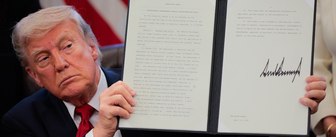Inflation currently leads the list of issues Americans say are most important to them, and polls show it is top of mind for voters going into Election Day next week. But how much do Americans know about the causes of inflation, and what do they think can be done to stop it? A recent YouGov poll finds that potential causes blamed by the most Americans are the price of foreign oil, government spending, and profit-maximizing corporations. The top three solutions viewed as effective at reducing inflation are increasing domestic oil production, investing in the supply chain, and fining companies for price gouging. Overall, the results suggest that many Americans' most urgent concern when it comes to rising costs is gas prices.
To help us understand what Americans think about policy regarding inflation, we first conducted a poll on October 21 - 24, 2022 asking people to tell us in their own words what policies they think the government should implement to help fight inflation. Responses to this question informed the design of a second, more-exhaustive poll, the results of which are published in this article.
Rising costs
How well do Americans understand which goods and services have gotten more — and less — expensive over time? We asked whether the cost of 16 goods and services has increased, decreased, or stayed the same over the past 20 years. Then, we compared their responses with data from the Bureau of Labor Statistics (BLS) indicating how much prices in each area have changed since the year 2000. According to the BLS, prices have dropped in at least five of the categories asked about — TVs, toys, cellphone services, computer software, and airfare. Majorities of Americans, however, believe the cost of each of the five categories has increased "some" or "a lot." The category that the largest share of people say has gotten more affordable — TVs — is still only thought to have declined in price over this period by 22% of Americans. However, many goods and services whose prices have increased more than the average inflation rate over the last two decades — including gasoline, hospital services, college tuition and fees, and child care — were among the categories whose prices the most Americans said had increased a lot.
Feeling the impact
Inflation's effects are felt broadly among most groups of Americans. Most Americans (55%) say they have felt the impact of high inflation in their own lives "a lot," and about the same proportions hold for men and women, and for white, Black, and Hispanic Americans. Among the bigger differences in how many say they've felt a lot of impact: 67% of Republicans vs. 38% of Democrats, 63% with an annual family income under $50,000 vs. 46% at $100,000 or more; and 61% in rural areas vs. 46% in cities.
Understanding inflation's causes and solutions
Americans are more confident that they understand the causes of inflation than the solutions. While 72% say they understand what causes inflation at least somewhat well, just 24% say they understand the causes "very well." Fewer (55%) say they somewhat understand the solutions to inflation than say they understand the causes, and just 17% say they have a very good understanding of the solutions. Nearly half of Americans (45%) say they understand the solutions to inflation not very well or not at all. Republicans are more confident than Democrats that they have a firm understanding of what causes inflation and how to solve it.
Placing blame
Who or what do Americans blame for inflation? The largest share (60%) place "a lot" of blame on the price of foreign oil, followed by 53% who place the same amount of blame on government spending and 52% who put a lot of blame on large corporations seeking to maximize profits. Half of Americans also say that the supply chain (50%) should receive a lot of blame, and a similar share (49%) say the same about COVID-19. More Americans say Democrats are a lot to blame (43%) than say Republicans are (30%).
Democrats spread blame for inflation around many different potential culprits while Republicans agree on a few main ones. Majorities of Democrats place a lot of blame on corporations (66%), foreign oil (62%), COVID-19 (57%), the supply chain (56%), and Republicans (53%). Republicans, on the other hand, are most likely to place a lot of blame on spending by the federal government (80%), Democrats (74%), and the price of foreign oil (65%). Few people in either party blame credit card purchases, the war in Ukraine, or the level of consumer demand.
Finding solutions
What measures do Americans think would be effective at decreasing inflation? We asked respondents whether 16 measures would decrease, increase, or have no effect on inflation, setting aside whether or not they supported or opposed them. The largest shares of Americans say that increasing domestic oil production (55%) and investing in the supply chain (52%) would definitely or probably be effective at reducing inflation. Fining companies for price gouging (47%) and enforcing limits on price increases (44%) are also seen as effective by many. Policies that people were least likely to say would decrease inflation include increasing the share of working-age immigrants (20% say this would decrease inflation), providing child care to workers (23%), preventing corporate stock buybacks (26%), and removing sanctions on Russia (26%).
Investing in the supply chain is the only policy asked about that majorities of both Democrats (57%) and Republicans (55%) agree would be effective at reducing inflation. A handful of other policies are seen as effective by a majority of Democrats or a majority of Republicans, but not both. Three-quarters of Republicans (73%) say it would be effective to increase domestic oil production and 50% say it would be effective to reduce spending on social services (50%). The two solutions that each are seen as effective by a majority of Democrats are fining companies for price gouging (65%) and enforcing price limits (60%).
— Linley Sanders contributed to this article
This poll was conducted on October 28 - 31, 2022 among 1,000 U.S. adult citizens. Explore more on the methodology and data for this poll.
Image: Adobe Stock (SERSOLL)









